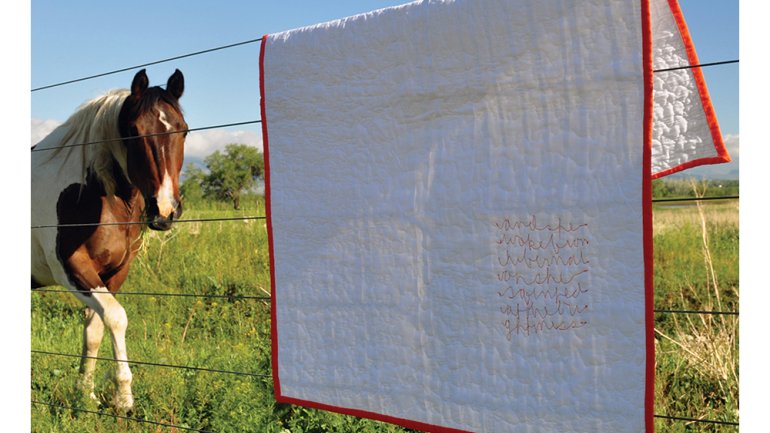The Sleep of Poets
The Sleep of Poets
Imagine dreaming afloat in a cloud, lulled by murmurs of ponderosa pines and a perfect moon. Such is the quiet magic of quilts from Kerry Larkin’s Comma Workshop, pristine white coverings so subtle that, at first glance, you might register only their tranquil, wavelike patterns and textures. Look closer, and you’ll find a story.
“We headed over the pass and down into the canyon, remember that lookout halfway down?” reads a snippet of stitchery on a quilt called Aspens Whisper for More Time. It’s prose poetry by Larkin, in her own handwriting, rendered in mostly white thread with a few choice words subtly highlighted in color. The look is clean and modern, the tone cozy and intimate.
“I like this idea of being sophisticated yet a little bit light and playful, timeless but of the moment, too,” says Larkin, 35, who launched Comma in 2010 and quickly attracted a following among design aficionados. Along with her original Context Collection, she now offers a second, lower-priced line called the Workshop Collection, as well as baby items, plus linen pillows to be launched this summer. The products all feature her original, nature-inspired writings, sometimes in softly elegant fonts along with the free-form cursive. She’s also happy to collaborate with clients on custom items, such as a wedding quilt covered in well-wishes from a couple’s friends and family. One woman whose daughter was graduating from a writing program commissioned a quilt based on the daughter’s prose. “It’s a joy,” Larkin says, “to do these things that come from people’s hearts.”
Putting words on quilts was “a natural progression” for Larkin, a voracious reader and writer. She grew up in western Pennsylvania in a family of crafters. Her great-grandmother and great-aunts were all quilters, her grandmother a seamstress and upholsterer, her grandfather a carpenter. She began her own career as an architect, always doing collage and sculpture on the side. A few years ago she was teaching industrial design at the University of the Arts in Philadelphia when she decided to move to Colorado to study meditation and Buddhist psychology. From there, she says, her vision for Comma Workshop came to light.
“I feel I’m taking this tradition that is so all-American and honoring my family and my heritage with a fresh perspective,” Larkin says. She now works out of a sunny studio
on the ground floor of an 1880s house in the quaint little town of Lyons, just north of Boulder at the base of the Rockies.
Meditation is key to the spirit of these quilts. The writing itself “comes from a very meditative and thoughtful place,” Larkin says. The name she chose for her business, when spelled as “komma,” is the word for “action” in Pali, the sacred language of the Theravada Buddhist canon. “It’s the idea of making these quilts with intention,” she explains. “In English, of course, comma means a breath or a pause. That in-between space is where the quilts emerge.” In a stroke of serendipity, her studio was formerly a meditation space and came with a built-in shrine, which she now has set up with pictures of her family.
“Every day I come in and take a few moments to be grateful for what I have and [I] set an intention for what I want to do in the space.”
Her designs begin as sketches on paper, which she develops on the computer, then refines on the sewing machine. The writing is integral to the quilt, stitched all the way through the top, batting and backing, a structural feature that appeals to the architect in Larkin: “I like that the words are the functional part that holds the three layers of fabric together.” Her prototypes are then made to order by a network of machine quilters living along Colorado’s Front Range.
Larkin describes them as “Renaissance women who decided they really loved quilting and wanted to pursue that. Or they wanted more time with their families, and this is a way to work from home.”
Like them, Larkin has crafted her life around quilting, and she’s finding it wonderfully fulfilling. “All the things I’ve done in my life have come together now in this form,” she reflects. “It’s great to be where you are, and say, ‘This is where I’m supposed to be.’ ”
Joyce Lovelace is the contributing editor for American Craft.

